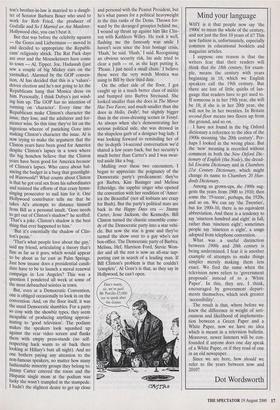Mind your language
WHY is it that people now say 'the 1900s' to mean the whole of the century, and not just the first 10 years of it? This new fashion is, unfortunately, especially common in educational booklets and magazine articles.
I suppose one reason is that the writers fear that their readers will think that the 18th century, for exam- ple, means the century with years beginning in 18, which we English speakers call the 19th century. But there are lots of little quirks of lan- guage that readers have to get used to. If someone is in her 19th year, she will be 18; if she is in her 20th year, she will not be in her twenties. In Britain second-floor means two floors up from the ground, and so on.
I have not found in the big Oxford dictionary a reference to the idea of the 1900s meaning 'the 20th century'. Per- haps I looked in the wrong place. But the 'new' meaning is recorded without comment in both the New Oxford Dic- tionary of English (the Node), the dread- ful Encarta Dictionary and in Chambers 21st Century Dictionary, which might change its name to Chambers 20 Hun- dreds Dictionary.
Among us grown-ups, the 1900s sug- gests the years from 1900 to 1910; then come the '19-teens', perhaps, the 1920s, and so on. We can say 'the Twenties', but for 1900-10, there is no equivalent abbreviation. And there is a tendency to say 'nineteen hundred and eight' in full, rather than 'nineteen eight'; sometimes people say 'nineteen o eight', a usage adopted from telephone convention.
What was a useful distinction between 1900s and 20th century is being undermined. I fear it is another example of attempts to make things simpler merely making them less exact. We find the same when the television news refers to 'government proposals' instead of to a 'White Paper'. In this, they are, I think, encouraged by government depart- ments themselves, which seek greater `accessibility'.
The result is that, where before we knew the difference in weight of seri- ousness and likelihood of implementa- tion between a Green Paper and a White Paper, now we have no idea which is meant in a television bulletin. Moreover, newer listeners will be con- founded if anyone does one day speak of a White Paper, or if they read of one in an old newspaper.
Since we are here, how should we refer to the years between now and 2010?
Dot Wordsworth


























































 Previous page
Previous page